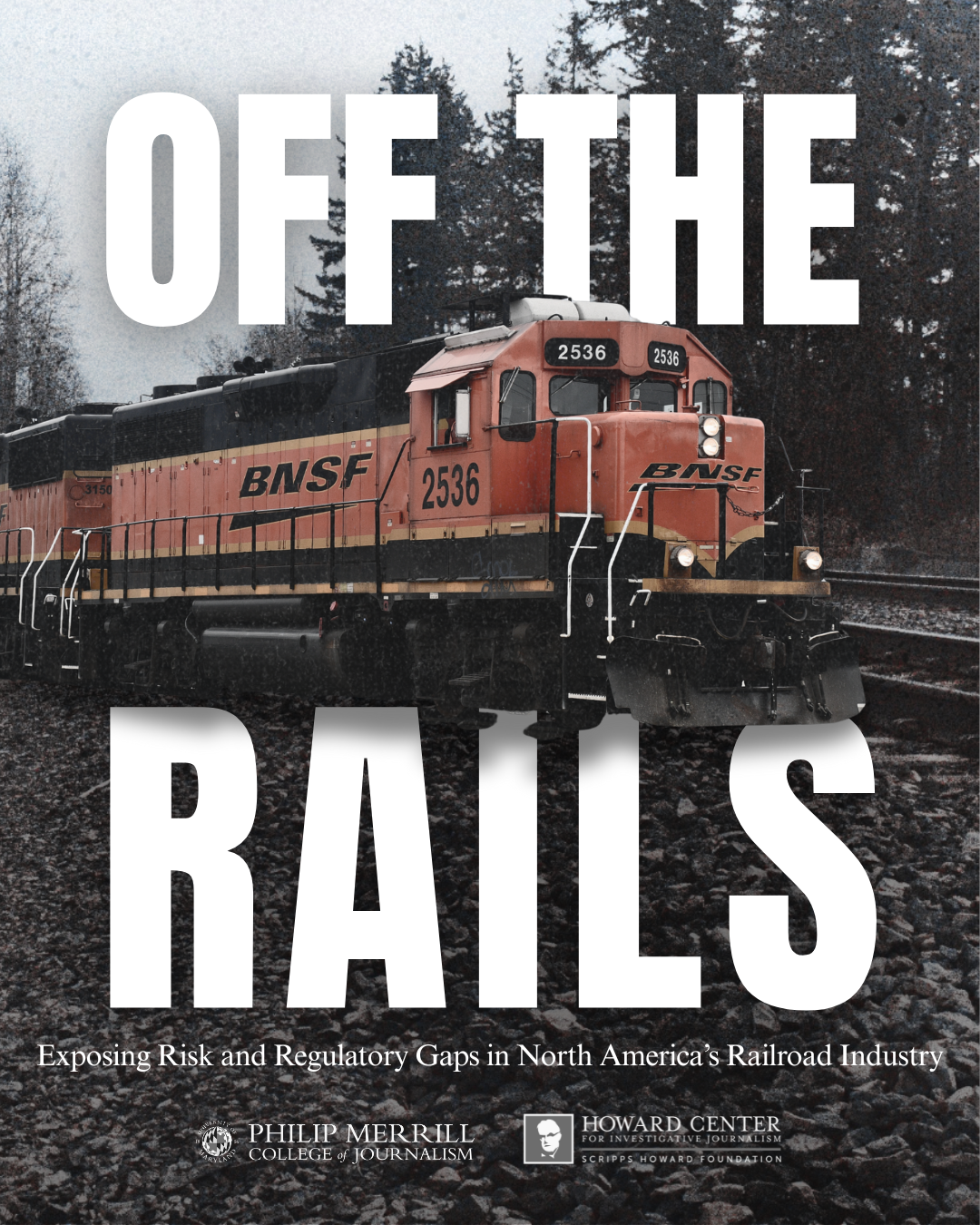COLLEGE PARK — More than two years have passed since the damaging 2023 train derailment in East Palestine, Ohio. But the serious questions raised by the disaster remain.
 The latest collaborative investigation led by the University of Maryland’s Howard Center for Investigative Journalism — “Off the Rails: Exposing Risk and Regulatory Gaps in North America's Railroad Industry” — explores those questions in an ongoing series to be published through the end of the year. The first wave of stories published in August.
The latest collaborative investigation led by the University of Maryland’s Howard Center for Investigative Journalism — “Off the Rails: Exposing Risk and Regulatory Gaps in North America's Railroad Industry” — explores those questions in an ongoing series to be published through the end of the year. The first wave of stories published in August.
Using unprecedented access to data from RailState LLC, which captures images of every car on every train moving through large swaths of the U.S. and most of Canada, the UMD Howard Center put together a reporting collaboration of university-based and professional newsrooms to provide information the railroads don’t want to share.
The Howard Center partnered with the UMD Philip Merrill College of Journalism’s Capital News Service, Arizona State University’s Howard Center, the University of British Columbia’s Global Reporting Centre, the University of Oregon, NPR, CBC and The Narwhal. Stories will also be distributed by The Associated Press.
The initial “Off the Rails” stories examine why safety recommendations to better regulate trains carrying hazardous flammable materials have been ignored, how railroad bridge safety across the U.S. is severely compromised by minimal federal and state oversight, and why local emergency responders may be ill-equipped to handle derailments of trains carrying hazardous material.
Key takeaways from the first wave of stories include:
- A train derails and spills at least 1,000 gallons of hazardous material in the U.S. about once every two months. Nearly half of those derailments resulted in evacuations; a quarter resulted in a fire or explosion since 2015, an analysis of federal data showed.
- Many first responders, especially in small towns and rural areas, lack the necessary training and equipment to effectively respond to hazmat derailments. A significant number of fire departments do not have specialized hazmat teams, and volunteers often make up the majority of staffing in smaller departments.
- Private rail companies are largely in control of inspecting and maintaining their own bridges and do not publicly disclose the results of their inspections, unlike the systems in place to make sure highway bridges are safe.
- Efforts to expand the regulation of trains carrying highly hazardous material in the wake of the East Palestine disaster have stalled in Congress, meaning railroads have to disclose less information to the communities they traverse.
STORIES:
- Many towns unprepared for derailments, hazmat spills that can trigger fires, evacuations (August 2025)
- Aging U.S. railroad bridges self-inspected, findings kept secret (August 2025)
- Apply safety rules to more flammable-cargo trains, lawmakers urge (August 2025)
- Train derailments and toxic spills: Even after multiple disasters, America’s railroads largely police themselves (Evident Media Mini-Documentary, August 2025)
- How you can learn more about local transportation of hazardous materials (August 2025)
- Railroads spurn system designed to prevent accidents (August 2025)
- Two years after derailment, trains with toxic chemicals still roll through East Palestine (February 2025)
- Health, environmental concerns divide East Palestine two years after train derailment, toxic fire (February 2025)
For information about publishing the project, contact Howard Center Director Kathy Best at klbest@umd.edu.
About the Howard Center
The Howard Center for Investigative Journalism, launched in 2019 and funded by the Scripps Howard Foundation, gives Merrill College students the opportunity to work with news organizations across the country to report stories of national or international importance to the public.
The multidisciplinary program is focused on training the next generation of reporters through hands-on investigative journalism projects. Students will learn to dive deep into data, ask tough questions of those in power and tell the stories they uncover in new and compelling ways.
For more information, contact:
Josh Land, Communications Manager
joshland@umd.edu
